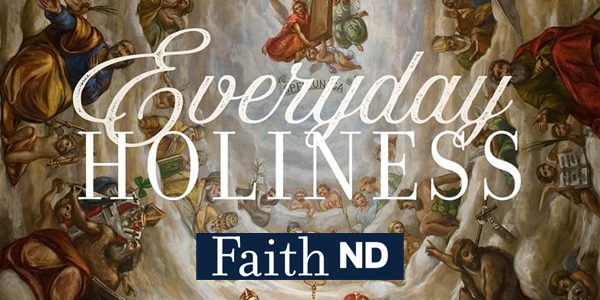Inspiring Conversations: Leading People in an Ever-Changing World – Paul and Cindy Karos
Subscribe to the ThinkND podcast on Apple, Spotify, or Google.
Featured Speakers:
- Cindy Karos, Founding Inaugural Member, The Order of the Myrrhbearing Women
- Paul Karos, Past President investment banking and equities, Piper Jaffray
- Tom Schreier, Co-Founding Director, Inspired Leadership Initiative
The Inspiring Conversations Series featured a discussion about faith and purpose with guest speakers Paul Karos, the former President Investment and Equities at Piper Jaffray, and his wife Cindy Karos, a founding inaugural member for The Order of the Myrrhbearing Women. This virtual event was led by Tom Schreier, Founding Director of the Inspired Leadership Initiative. Through this discussion, Paul and Cindy Karos demonstrated ways in which individuals can deal with grief, life’s ever-changing transitions, the importance of faith, and healthy relationships.
In the beginning of the discussion, Paul spoke of his eye disease’s effect on his life and his relationships. The disease, retinitis pigmentosa, leads to eventual blindness. As a child, in addition to the bullying and rejection he experienced in school, Paul had several underlying fears about his life, such as his ability to attend college. However, there were several blessings that resulted from Paul’s ability to persevere. Cindy explained that, although Paul was a successful man on Wall Street, he is probably one of the most humble people she has ever met. They both recognized the gift—as one sense was lost, the others grew stronger. When his children were having a bad day, he sensed it. When his employee was tentative about a project, he sensed their reluctance. Cindy explained, “Once you get to know Paul, you are blinded by his blindness.”
In the next topic of conversation, Paul and Cindy explained their transitions in life. For Paul, he spoke of his transition from credit analyst to president of investment banking and equities to working on Wall Street to going back to get a theological education and ministry work. Throughout this, Paul realized the importance of cultivating one’s individual gifts and talents that God has gifted them. He explained this through a metaphor: “Every human being has the seed of virtue planted in their garden by God.” These seeds (of kindness, patience, gentleness, and so on) must be cultivated. Paul explained that a human being’s goal is “to have a garden that has enough fruit production to sustain ourselves and have abundance to share with other people.” For Cindy, she explained the struggle of her transition from an international saleswoman to being a mother. In her eyes, becoming a mother constituted giving up all her gifts from God to simply run a family. However, Cindy realized the importance in teaching children to love God—your gifts don’t disappear when you make transitions in your lives, they are always needed!
Paul explained the importance of recognizing that every human being is made in the image and likeness of God. Instead of only looking for mistakes, there must be an internal recognition that you are precious in God’s eyes, and so is everyone else. Cindy further emphasizes through quoting her mother’s words: “When you’re dealing with someone who is difficult or who is angry or mean, know on the inside that there might be something hurting that person.”
In the next topic of the discussion, Paul and Cindy further expanded on the role of their religion in their own lives. As members of the Eastern Orthodox Church, they placed great importance in the journey to becoming more Christ-like (“askesis”). By doing so, religion became the foundation of their family; they encouraged their children to explore their faith as well as take time to have honest discussions with each other, which greatly helped in maintaining good relationships.
In the Q&A portion of the virtual event, the couple answered a wide range of questions, touching on the importance of coping with anger as well as purposeful leadership. They explained the importance of discovering the real meanings behind the wounds in order to be pure in our own heart so that what is coming out of us is pure. At the end of the discussion, the couple called on listeners everywhere to slow down, as sometimes life moves too quickly to recognize one’s true purpose.
- Suffering can lead to so many blessings. When you cater yourself to look for the good, your outlook on everything changes. (6:50)
- God has planted a seed of virtue in every human being’s personal garden. These seeds—kindness, gentleness, patience, courage, etc.—must be cultivated throughout our lives. We must cultivate a garden that has enough fruit to sustain ourselves as well as share with others. (16:51)
- While we may make transitions throughout our lives, our gifts won’t simply disappear. Although it may take a while to find those gifts, there will be so many opportunities to use them. (22:37)
- When you take a stance, you must ask yourself: How am I viewing other human beings? Having a positive stance on human beings (believing that every human being is made in the image of God) is incredibly important in leadership and in life. When you take that stance, it rubs off on the people around you. (24:51)
- Try to keep your faith in the center of your life. If you foster healthy conversations with your spouses and take time to center yourself every day, your relationships and livelihood will improve. (36:30)
- “I use this verse even when I speak at secular settings, like at a school or at a business, it’s almost like literature—it’s human truth. And it goes like this, it says, ‘We rejoice in our suffering, for suffering brings endurance, endurance brings character, and character brings hope, and hope does not disappoint.’” (Paul Karos quoting Romans 5:35, 6:13)
- “Someday you’re going to meet him, Jesus Christ, and he’s going to say to you: Did you do everything you could to help your kids know and love me? And if you can’t answer yes, forget those leadership skills.” (Cindy Karos quoting an abbess, 21:20)
- “Be bold and be courageous and know that the gifts that you have will be effective in other ways.” (Cindy Karos, 23:27)
- “We can’t control other people, but we can surely try our best to work on controlling our own tongue and have it be for edifying and advising and lifting up and inspiring and lovingly correcting.” (Paul Karos, 51:10)
- “We’re all moving in such a fast way that it’s a waste to just move through life. You need to think about what the purpose is and actually make decisions about what you’re doing as a team to make it a priority.” (Cindy Karos, 52:58)
Related Content
Shannon Sharpe/Katt Williams, The Black Impact on the NFL Super Bowl & Taraji P Henson
In the first episode for Season 8, Isaiah and Tykiera talk about the Shannon Sharpe/Katt Williams Interview that took the internet by storm at the beginning of the year as well as...
watch videoEveryday Holiness: John Cavadini
Dr. John Cavadini, director of the McGrath Institute for Church Life and professor in the theology department at the University of Notre Dame, shares some of the hidden aspects...
View EventClimate Change and The Limits of Narrative
Join the Kellogg Institute for the introductory session of a workshop refining Kellogg Faculty Fellow Roy Scranton’s draft book project “Ethical Pessimism: Climate Change and...
View Event


